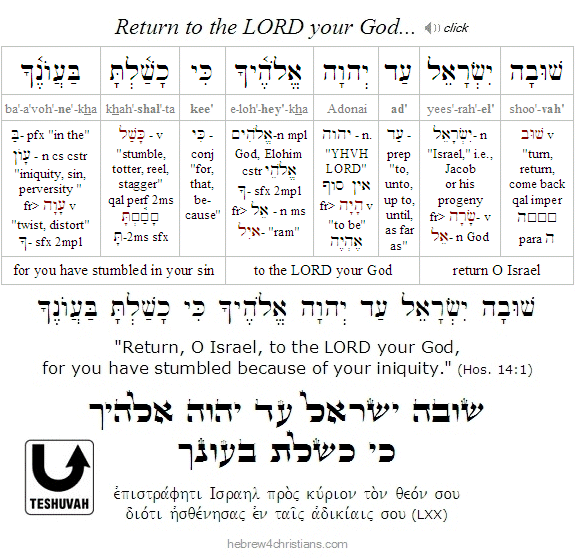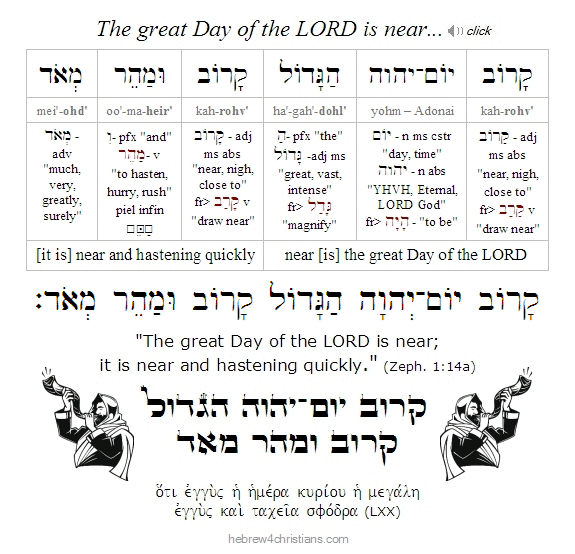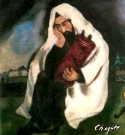|
The Second Temple was destroyed by the Romans in 70 A.D. (as Yeshua had foretold, see Matt. 24:2; Luke 19:44), yet despite the miraculous return to their promised homeland over the past century (Deut 30:1-3; Jer. 32:27; Ezek. 34:13), the Jewish people still are in a state of spiritual exile, or golah (βΧΦΌΧΦΉΧΦΈΧ) to this day, awaiting their final redemption, called the ge'ulah (βΧΦΌΦ°ΧΧΦΌΧΦΈΧ). In this connection the sages note the difference between the two words "golah" and "ge'ulah" is expressed by the presence of the letter Aleph (Χ) signifying God, the overmastering Champion (i.e., aluf: ΧΧΧΦΌΧ£) of the universe. This indicates that the golah will last only until the LORD's revelation of Messiah as the overcoming Go'el (ΧΦΌΧΦΉΧΦ΅Χ) of the Jewish people, at which time all Israel will be redeemed and the promises of Zion will finally be fulfilled (see Matt. 23:39; Rom. 11:26; Isa. 59:20). At that coming time Tishah B'Av and the other fast days of the year shall become "occasions for joy and gladness, happy festivals for the House of Judah" (see Zech. 8:19). Amen. Shuvah Yisrael ad Adonai Elohekha (Χ©ΧΧΦΌΧΦΈΧ ΧΦ΄Χ©ΧΦ°Χ¨ΦΈΧΦ΅Χ Χ’Φ·Χ ΧΦ°ΧΧΦΈΧ ΧΦ±ΧΧΦΆΧΧΦΈ), "Return O Israel to the LORD your God" (Hos. 14:1).
 |
Although "Day of the LORD" (i.e., yom Adonai: ΧΧΦΉΧ ΧΦ°ΧΧΦΈΧ) is often associated with Tishah B'Av and the catastrophic destruction of the Jewish Temple, the words of the prophets were only partially fulfilled, and there awaits another Day coming when God will terribly shake the entire earth (Isa. 2:19). "For the great day of their wrath has come, and who can stand?" (Rev. 6:17). The prophet Malachi likewise says: "'Surely the day is coming; it will burn like a furnace. All the arrogant and every evildoer will be stubble, and that day that is coming will set them on fire,' says the LORD Almighty. 'Not a root or a branch will be left to them'" (Mal. 4:1). For those who are godless, the great Day of the LORD is a time of horrific judgment, but for those who belong to the LORD, it represents a day of victory and great blessing. Regarding that day the prophet Malachi said, "Then you will trample down the wicked; they will be ashes under the soles of your feet on the day when I do these things" (Mal. 4:3).
Ultimately the Great Tribulation period is purgative and restorative for Israel (sometimes called yissurim shel ahavah, or "the troubles of love"). The prophets wrote that Zion will go through labor and then give birth to children (Isa. 66:8). Thus the Vilna Gaon wrote that the geulah (national redemption) is something like rebirth of the nation of Israel. This accords with the prophetic fulfillment of Yom Kippur as the Day of Judgment and time of Israel's national conversion. In the verse from prophet Jeremiah regarding the "Time of Jacob's Trouble," it's vital to see the goal in mind - "yet out of it he is saved" (ΧΦΌΧΦ΄ΧΦΌΦΆΧ ΦΌΦΈΧ ΧΦ΄ΧΦΌΦΈΧ©ΧΦ΅Χ’Φ·). When Yeshua returns to Zion, all Israel will be saved (Rom. 11:26). The sages note that childbirth is a time of radical transition and struggle for the baby -- from the time of relatively peaceful existence within the womb into the harsh light of day -- and therefore a similar transition between this world and the Messianic world to come is about to take place...
 |
|



